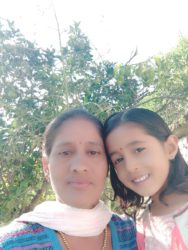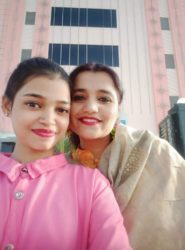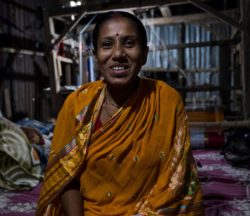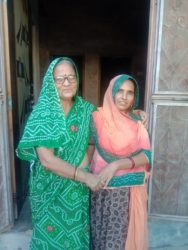November, 2020
4 stories of 4 inspiring women who work as home-based entrepreneurs and are associated with SEWA Bharat
6 minutes read
Cementing individual lives for the greater good, solidarity has found a louder voice in these chaotic times – especially through the digital medium. One such platform is Anubandh (translated as “everything is connected”), started by SEWA Bharat – a globally recognized trade union of women workers in India’s informal economy. Calling women artisans, farmers, and weavers from the states of Rajasthan, Uttarakhand, and West-Bengal our Behene or our sisters, they promote the products made by the members of their sorority.
Here are some of their stories:

Bhawana Behen from Uttarakhand says, “I love to meet other women and learn from their experiences and tell them to learn from my story!”.
Hailing from a small village in the foothills of the Himalayas in Uttarakhand, she manages to grow chillies and turmeric that she sells to earn a living. Devastated by the untimely demise of her husband 6 years ago, Bhawana behen decided, as she says, “to not get caught in the madness of mundane household chores and….to adopt a daughter…I brought her home when she was only 5 days old!” Hence, began her journey towards independence. She was a small-holder farmer but did not have many sales opportunities for her excellent produce. Things changed once she got associated with SEWA.
She has been associated with SEWA for more than a year now and often travels to a city named Almora that is almost 100km from her village to deliver the raw spices to a mill that is owned by a cooperative supported by SEWA. Not only this, but she also collects raw spices from other women in her village and hence helps them to earn a decent living. She has managed to bring more than 2300 women to become its members. She says, “Whenever I meet women who are eager to join SEWA I tell them to learn from me..that how a little bit of courage helps you to be on your own feet!”
Despite all odds during the pandemic, Bhawana behen, still, managed to deliver the raw spices to the mill in Almora! She was also involved in identifying very low-income families in her village that SEWA supported with monetary help during the lockdown.
When asked about her future she says, “Firstly, I wish to continue working for SEWA because I really enjoy it and that it has given me recognition too. Then I wish that my daughter receives the best of everything. Finally, I hope that women recognize that they are not meant for household chores and there are so many new things to learn that make your time and life valuable.”

Aarifa Behen from Rajasthan says, “I want to study commerce to help my family in their business”.
Talking about silver linings and finding hers in choosing commerce over medicine, 19 year old Aarifa behen says,”That’s fine since I can now understand some business and help my family.”
She cheerfully shares me about going against her parents wishes. She says, “They wanted me to do private studies such that I can stay home and help them..but I went enrolled in regular college…”, and adds sombrely ,”but what to do ma’am now the classes are suspended due to Covid and business is also on the low side.”
Her father and brother have a small scale business of aari tari embroidery handiworks, and she too has acquired the skill for it while, also, colouring bandhej clothes. But she mainly dabbles in lac jewellery.
Since her father’s business was affected by the pandemic, they were looking for some way to make money from home. She gleefully remembers, “Then after trying to find some work we eventually got the order to stitch masks from SEWA…. And ma’am I could earn 3000rs.!”
She narrates, “When I started working I only knew how to make bangles with colorful stones but thanks to SEWA for organising a training programme and thanks to my teacher Didi because of whom today I can make a variety of jewellery and also other things like saree pin, saree brooch etc.”
About the future Aarifa behen vocalises her hopes – “I want to study further and as far as I can and keep on helping my family with even better business ideas”.
Amrita Behen from West Bengal says, “Our entire world runs by the money I earn”

While she initially wanted to be a singer, fate had other plans for her. Amrita Behen married early on in her life with 4 children to support, Amrita Behen says, “I’m presently doing everything to improve our financial condition”.
The tin-roofed house that she lived in for so many years completely broke down during the Amphan cyclone tragedy. Along with it, her loom also was destroyed. She had to move into another tiny tin-roofed house where her second loom was placed.
Going against the expectations of her community about women not leaving their houses, she sought to make a living a different way as “the wholesalers would not lend me any material without any money!” Since she could not rely solely on the work of weaving for earning a living, she soon took up the business of travelling to her neighbouring localities on a cycle and selling ready-made clothes to people.
It was during the lockdown period that she started working with SEWA. She says that SEWA quotes a price higher on her sarees than the middleman which has really helped her financial situation. She also encourages other women to tag along with her to SEWA meetings so that they may also improve their livelihoods.
Amrita behen is now striving hard to return to a state of normalcy and is hopeful to improve her financial condition by selling her sarees through SEWA.
She claims, “SEWA has given women like me the opportunity to come out of a life of confinement and learn more about the handloom industry.”

Bebi behen from Rajasthan says, “See my hands are like wood!”
She narrates, “I came to Bikaner from my village 15 years ago after my husband passed away and also brought my two young kids with me. I did not have a proper place to stay and felt very lonely and lost in this big city.” Seeing her lonely with no source of income, a relative of hers told her about SEWA and how she could earn some money by making papads!
There has been no stopping till today! She says, “My daughter is a teenager now and she helps me in papad making. Together we can make a whopping number of 1500 papads every day and even more if the need arises…but we have to wake up at 4 a.m. everyday without fail!..but today madam I have a house of my own and I also managed to buy a motorcycle for my son. ”
Proud of herself, Bebi behen feels overjoyed to help those in need. Asha behen (SEWA volunteer) reports that Bebi behen is known to her fellow women as a resourceful person and has helped several women to become part of SEWA.
Quick at calculations, she was also part of a campaign formed by a group of women that lasted for two years and their demand was to get a higher price for a kilogram of papad. They indeed succeeded and today instead of Rs. 6 per kilogram they are able to sell it for at least Rs. 23 per kilogram!
About COVID and its impact, she claims, “In the beginning we were very scared as the demand fell suddenly but with the help of SEWA we have again started to work at full capacity and hopefully madam it will get even better.”
When asked about her other hobbies and aspirations she laughs and says, “No madam..I only know and only love making papads!….I hope that I can keep on supporting my family as long as my strength allows through this small business of ours”.

[…] fine Saturday, amidst the pandemic of 2020, a few people gathered on Google Meet to talk about the story behind the stories. The story of SEWA Anubandh that brought forward the stories of women working in the informal […]